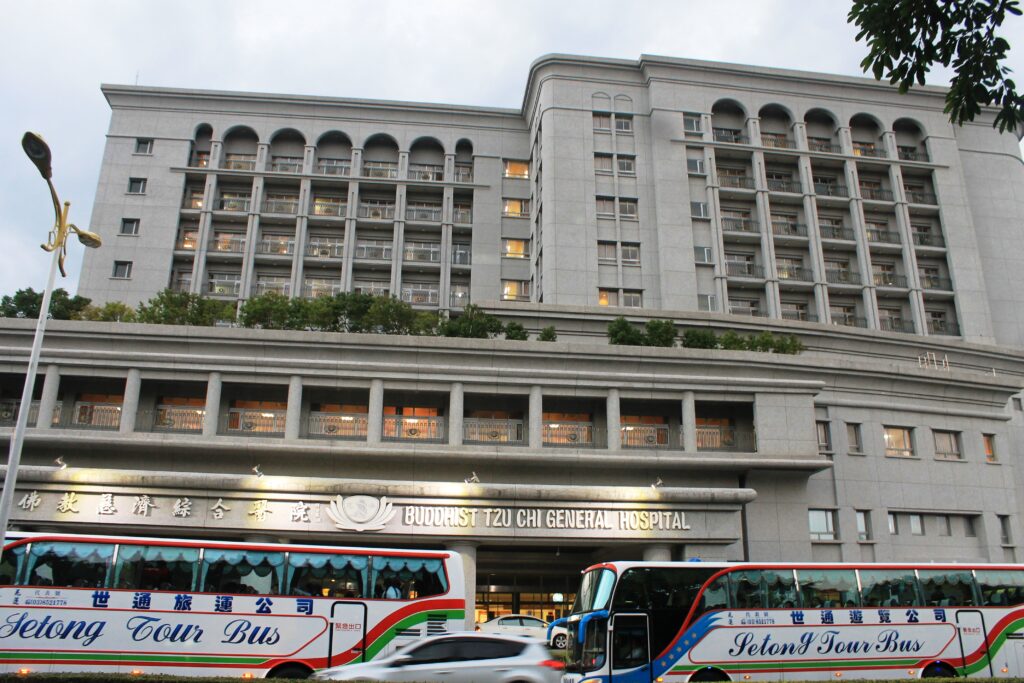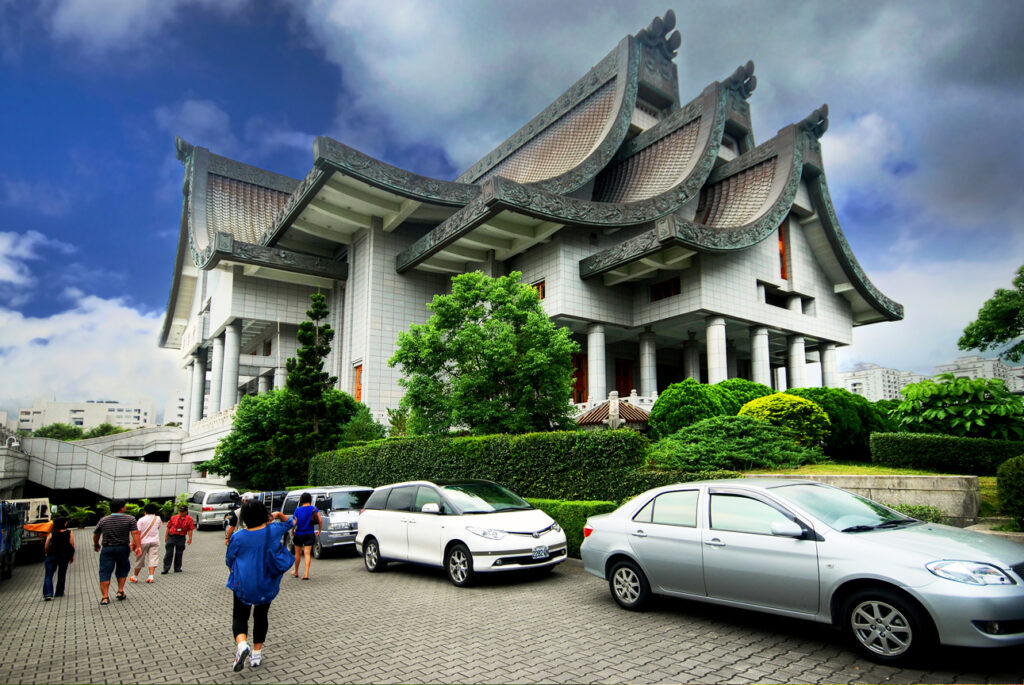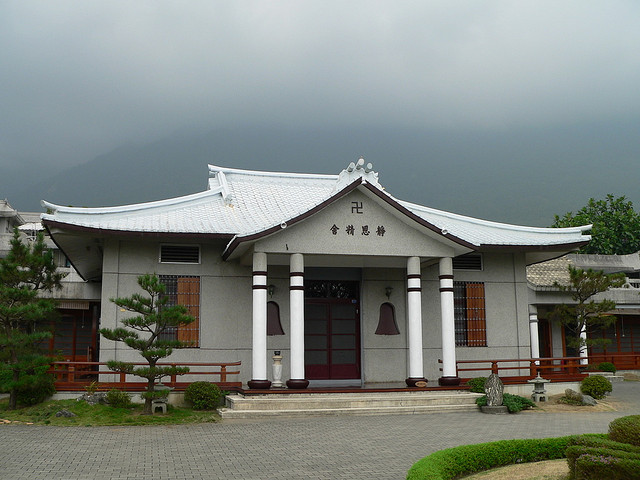By Jason Lee
Cross-references: Taichung Tzu Chi Hospital (Taichung, Taiwan); Tzu Chi Medical Foundation (Los Angeles, CA)
Founded in 1966 by Dharma Master Cheng Yen (證嚴法師), the Buddhist Compassion Relief Tzu Chi Association (慈濟基金會) has since grown be one of the largest Buddhist charity organizations with international branches operating in over 50 countries. Headquartered in Hualien, Taiwan, Tzu Chi is regarded as one of the “Four Great Mountains” (台灣佛教四大名山) alongside Fa Gu Shan (法鼓山), Fo Guang Shan (佛光山), and Chung Tai Shan (中台山) (Watts and Tomatsu 2012, 111). Among the four most prominent Buddhist organizations in Taiwan, Tzu Chi is the only one led by a female Buddhist master. In particular, Tzu Chi also stands out not only due to its core members being mostly composed of women but also for its predominantly female laity (Lee and Han 2016, 63). Along with its main priorities in medical charity, Tzu Chi has therefore been of interest to many scholars of Buddhism and medicine who have sought to study its origins and development through analytical frameworks from gender studies, sociology, history, etc (Jones 2009, 292).
Global Tzu-Chi
With over 10 million followers worldwide, Tzu Chi has been characterized as a lay Mahayana Buddhist movement (Gombrich and Yao 2013, 242). Although its philosophies are rooted in traditional Mahayana texts, Master Cheng Yen has sought to re-emphasize certain doctrines in her own teachings. Specifically, Master Cheng Yen has underscored the values of renjian fojiao (人間佛教), humanistic or engaged Buddhism. As one of the most significant movements in modern Buddhism, engaged Buddhism stresses the importance of applying Dharma teachings to actions that address social inequality and human suffering (Schak and Hsiao 2005, 3). Highlighted in her sermonettes known as “Jingsi Aphorisms” (靜思語), Master Cheng Yen has delved into the various ways in which Buddhist teachings can be applied to everyday life, thus embodying the ideals of engaged Buddhism (Schak and Hsiao 2005, 12). Instead of solely expending time and energy on meditations and rituals, a strong emphasis on enacting acts of service has in turn manifested into a vast worldwide network of Tzu Chi volunteers.
Globally, Tzu Chi has been greatly involved in disaster relief work. As part of the Tzu Chi International Medical Association (TIMA), Tzu Chi physicians have been heavily engaged in on-the-ground medical care. In response to the Syrian refugee crisis, for example, Tzu Chi volunteers had set up free clinics in Jordan to care for patients in refugee camps (Zhang 2018). More recently, responding to the COVID-19 pandemic, Tzu Chi volunteers have also been involved in worldwide efforts to fundraise and donate medical supplies (Ye 2020).
Tzu-Chi in Taiwan
Based in Hualien, Taiwan, the Tzu Chi Jingsi Abode (靜思精舍) or the Abode of Still Thoughts is considered as the headquarters of the organization. As the place where Master Cheng Yen personally resides, the Abode is also regarded as the “spiritual home” of Tzu Chi followers and members (Huang 2009, 45). Roughly five miles away in Hualien City, the Hualien Tzu Chi Hospital (花蓮慈濟醫院) opened in 1986 as a response to a lack of medical institutions on the east coast of Taiwan (Buddhist Tzu Chi Medical Foundation 2016). As the first Buddhist hospital in Taiwan, the Hualien Tzu Chi Hospital predominantly practices modern Western medicine, with Chinese medicine listed as one of its many departments (Huang 2017, 73). As such, the hospital holds various centers for specialized care, ranging from organ transplantation to bone marrow/stem cell transplantation. Within the surrounding area of the hospital, Tzu Chi also built Tzu Chi Jingsi Hall (靜思堂) or the Still Thoughts Hall, which partially serves as the organization’s historical museum with Buddhist archives and objects (Buddhist Tzu Chi Medical Foundation 2016). Close to Jingsi Hall, Tzu Chi also opened its medical college in 1994 with the goal of training future physicians who would provide humanistic care. Since then, the college has since expanded to enroll students in the humanities and social sciences and is now part of Tzu Chi University as the College of Medicine (Huang 2009, 43). In addition to Tzu Chi University, Tzu Chi also founded Tzu Chi University of Science and Technology and Tzu Chi Senior High School.
Expanding beyond the Hualien sites, Tzu Chi hospitals were subsequently built in Dalin, Kuanshan, Taipei, Taichung, and Yuli (Huang 2009, 55). Encompassing Northern, Central, Southern, and Eastern Taiwan, each hospital’s location is picked with specific purposes in mind. The Taipei Tzu Chi Hospital, for example, has had initiatives tackling urban mental health issues through stress reduction training and suicide prevention (Taipei Tzu Chi Hospital 2017). As the Tzu Chi hospital located closest to Taiwan Taoyuan International Airport, the Taipei Tzu Chi Hospital also serves as a key site for coordinating Tzu Chi’s international medical relief missions (Taipei Tzu Chi Hospital 2017). In contrast, the Dalin, Kuanshan, and Yuli hospitals are heavily involved in rural outreach work in Taiwan. For example, the Dalin Tzu Chi Hospital has been engaged in community health work through setting up medical stations in remote areas to provide telemedicine services (Buddhist Tzu Chi Medical Foundation 2016).
Throughout all the Tzu Chi hospitals, vegetarianism is also heavily emphasized for environmental, ethical, and nutritional reasons. As such, all the Tzu Chi hospitals provide vegetarian-only meals (Buddhist Tzu Chi Medical Foundation 2016). On the same note of environmental preservation, Tzu Chi hospitals are also involved in various “green hospital” initiatives. Such efforts include promoting recycling, minimizing hospital waste, and implementing green architecture and technology (Wu 2008).
Media
Google Street Views
Scholarly Sources
- Gombrich, Richard and Yu-Shuang Yao. 2013. “A Radical Buddhism for Modern Confucians: Tzu Chi in Socio-Historical Perspective.” Buddhist Studies Review, 30 (2), 237–259.
- Huang, C. Julia. 2009. Charisma and Compassion: Cheng Yen and the Buddhist Tzu Chi Movement. Cambridge, MA: Harvard University Press.
- Jones, Charles. 2009. “Modernization and Traditionalism in Buddhist Almsgiving: The Case of the Buddhist Compassion Relief Tzu-chi Association in Taiwan.” Journal of Global Buddhism, 10, 29–319.
- Lee, Chengpang and Ling Han. 2016. “Mothers and moral activists: Two models of women’s social engagement in contemporary Taiwanese Buddhism.” Nova Religio: The Journal of Alternative and Emergent Religions,19 (3), 54–77.
- Schak, David, and Hsin-Huang Michael Hsiao. 2005. “Taiwan’s Socially Engaged Buddhist Groups.” China Perspectives 59, 1–18.
- Watts, Jonathan S. and Yoshiharu Tomatsu. 2012. “The Development of Indigenous Hospice Care and Clinical Buddhism in Taiwan” In Buddhist Care for the Dying and Bereaved. Boston: Wisdom Publications.
- Wu, Wan-lin. 2008. “Environmental Protection in 6 Tzu Chi Hospitals,” Medicine With Humanity 9, 25–29.
External Links
- Buddhist Compassion Relief Tzu Chi Foundation. “Great Compassion without Regrets – Introduction to Tzu Chi’s Medical Mission,” November 25, 2008. http://www.tzuchi.org.tw/en/index.php?option=com_content&view=article&id=288%3Agreat-compassion-without-regrets-introduction-to-tzu-chis-medical-mission&catid=78%3Amissionofmedicine&Itemid=178&lang=en.
- Buddhist Compassion Relief Tzu Chi Foundation. “Tzu Chi Architecture” http://www.tzuchi.net/tcsc.nsf/4ed13b4bde8b5d6748256ae000224312?OpenView
- Ye, Zi-hao. 2020. “Let Love Travel During COVID-19” Tzu Chi Bimonthly. July 2020, https://web.tzuchiculture.org.tw/?book=July%202020&mptce=8255.
- Zhang, Jing-mei. 2018. “Free Clinics for Syrian Refugees” Tzu Chi Bimonthly. November 2011, https://web.tzuchiculture.org.tw/?book=November%202018&mptce=6427.



